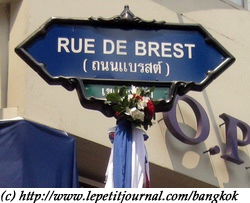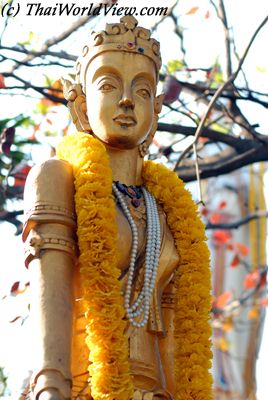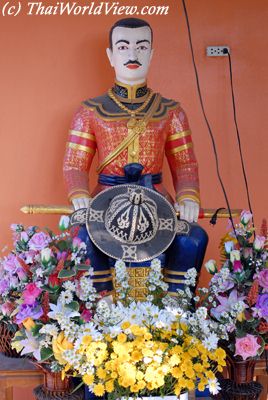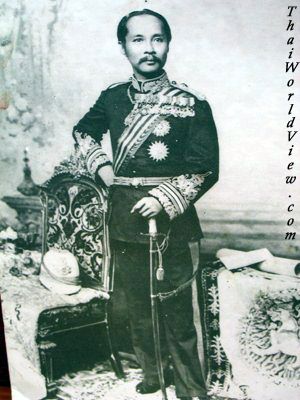

|
Before any Thai kingdom, there were Khmer kingdoms.
Khmer empire was made of actual Cambodia, Laos and a big part of
Thailand. Some towns like Lopburi, Phimai still have
Khmer ruins. In all northeastern area
there are many old Khmer ruins not all in good condition. The major
ones are in Phimai (near Nakhon Ratchasima) and
Phanom Rung (near Buriram). The most beautiful Khmer
ruins outside Cambodia can be seen in Thailand.
|

|
| Phimai sanctuary |
|---|

|
In 1238
Sukhotai kingdom was created.
It did last until 1438.
This period is well known for the Sukhotai Buddha statues
that are very beautiful. Some can be seen at the National Museum
or "WAT BENCHAMABOPHIT" in Bangkok.
Almost all monuments are made of light bricks. So
they didn't resist to monsoons over centuries. The ruins in old
cities of Sukhotai, Kampeang Phet, Sri Sichanalai
are worth visiting.
|
| Sukhotai |
|---|
Old city of Sukhotai has been recognised by UNESCO as a treasure of humanity. The famous King Rama Khampheng was the first to write with the first known representation of Thai writing. He says that Thai people do not starve because they have rice in the fields and fish in the rivers. Sukhotai was absorbed by the rival kingdom of Ayuthaya.
|
Ayuthaya was a great kingdom. Its
capital had more than one million of inhabitants, i.e. more than in
European capitals at the same time. Kingdom of Ayuthaya had diplomatic
relations with European countries such as Portugal and
France.
|

|
| Ayuthaya |
|---|
King Narai's diplomats went to France in year 1687 to the Royal court of Louis XIV, the French King who did build Versailles. They arrived by boat through the French town called Brest. Since year 1742 the major street of Brest is called Rue de Siam which means "Siam street".

|
In year 2013, in Bangkok, Charoen Krung soi 36,
where is located the French embassy for 150 years, was renamed Rue de Brest.
|
| Bangkok |
|---|
This event celebrated three centuries of friendship between Thailand and France.
|
Kingdom of Ayuthaya was always in war with Burmese,
Laotian and Khmer kingdoms.
Suriyothai, Queen of Ayutthaya, fought and died to protect her husband and
his life while advancing into battle against the invading Burmese battalion in
the 14th century.
|

|
| Suriyothai |
|---|
Nai Khanom Tom was a famous Thai boxer, who, having been captured by the Burmese, regained his freedom by defeating nine of the enemy's gladiators in a contest witnessed by the Burmese king.

|
The King Naresuan is famous for having a duel on elephants with the Burmese Crown Prince
and won against him in 1593. King Naresuan regained independence
from Burma for the Ayuthaya kingdom.
|
| King Naresuan |
|---|
Ayuthaya defeated Khmer kingdom and seized the mythic town Angkor in 1431. More than 37 wars opposed Burma and Siam during three centuries. Finally Ayuthaya was defeated in 1767 by Burma. Ayuthaya was complete destroyed, Buddha statues were molten in order to get the gold. Still nowadays the old remaining ruins can be visited.
In 1782 General Taksin succeeded to beat the Burmese Kingdom. He did establish a new capital Thonburi.
|
After Taksin's death, Rama I became the first
king of the Chakri dynasty. He did establish a new
capital Bangkok on the other
shore of the river Chao Praya.
|

|
| Wat Phra Kaew |
|---|
Rama IV is very famous. His name was Monkgut. Before being king, he was a monk until 45 years old. He was very clever and even calculated the date of an eclipse. Pitiful he caught malaria when observing this eclipse.

|
Rama V (dead in
1910) is known as the King Chulalongkorn. He is still highly
worshipped in Thailand. His statue is at "Ratchadamnoen
avenue" near Dusit Throne Hall.
Every year, on the 23th october,
there is a huge crowd for his
birthday celebration. He is famous because he worked for the
improvement of Thailand in the modern world.
|
| Bang Pa In |
|---|
Rama V is the one who made school mandatory for all, suppress slavery, transform the administration to match with foreign administration. It was the only way to escape from the invasion of colonial French and English troops. It was to show them that Thailand was a modern country. But he did not succeed to avoid territorial cuts, i.e. France did take Laos and Cambodia west part that were under Thai rules and also southern provinces that were taken by English troops. He is the one which brought many foreign customs (table, chair, fork, spoon, woman with long hairs) in Thailand. He also sent his children abroad in order that they studied foreign methods and then came back in Thailand to support him.
|
23 October is Rama V 's day (
วันปิยมหาราช) and is a public day to commemorate the
Rama V or Chulalongkorn wise reign over Thailand.
|

|
| Rama V |
|---|
The Paknam Incident on July 13, 1893 is remembered as a dispute over a large part of Laotian territory on the banks of the Mekong River and led to a military clash between Siam and France on the Chao Phya River near Bangkok. Siamese troops opened fire on French gunboats sent up the river to Bangkok. The French fired back. The battle ended with the loss of 151 Siamese soldiers and 32 French troops. The Treaty of Peace and Convention between France and Siam was signed in Bangkok on October 3. Under the pact, Siam had to renounce all rights to the territories on the left bank of the Mekong (about 143,800 square kilometres) and to all islands in the river.
Before Thai kings have several wives and queens. There was a rank between all his wives. That is why after 5 generations , all royal status disappear because there will be too many people with a royal status. Nowadays the king acts as normal person and has one wife.

|
Before Thailand was called kingdom of Siam. It has
changed the name in 1933. Actual King is
Rama IX who became king in 1946.
|
| Rama IX |
|---|
A bloodless revolution in 1932 put an end to absolute monarchy in Thailand and led to a constitutional monarchy.
October 14, 1973, October 6, 1976, and Black May 1992 are major dates in Thai history for the struggle for democracy. The Thai army has shot on Thai people on these three events. There has never been any formal apology. Each time the Thai army has said it could never happen again.
Between 1963 and 1973 Field Marshal Thanom Kittikachorn presided over a repressive military regime which was overthrown by pro-democracy students who suffered scores of casualties the 14 October 1973.
FM Thanom is also at the origin of the Thammasat university massacre. His return in 1976 from overseas exile in the robes of a monk provoked the anger of students. This leaded to the 6 october 1976 massacre in Thammasat university where 300 students were killed by soldiers. Military argued that these students were a communist threat for the country. After the massacre many students joined the PLAT (Popular Liberation Army Thai) and fought until the amnesty in the 1980's.
Black May in 1992 happened when pro-democracy protesters were brutally suppressed by military forces under army commander Gen Issarapong Noonpakdi. In the attack on protesters demanding Gen Suchinda Kraprayoon step down as Prime Minister, 48 died and 44 went missing, according to official accounts.
In 1999 complaints arose due to the appointment of FM Thanom Kittikachorn as a special royal guard. FM Thanom Kittikachorn is remembered as one the men who crushed the 1973 pro-democracy uprising in which 77 people were killed and 800 injured. Prime Minister Chuan Leekpai, facing protests against his decision to award a former dictator a military honour, plans to set up a special committee to review the historical record of the October 14, 1973, uprising. Chuan Leekpai has built his political credentials largely on being a dedicated fighter in the battle for democracy. And so it is ironic that it should be he, as defence minister, who appointed FM Thanom Kittikachorn to an honorary position with the army.
| Home > Society > Thai History |

|